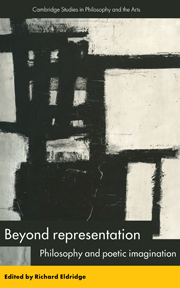Book contents
- Frontmatter
- Contents
- List of contributors
- Editor's acknowledgments
- 1 Introduction: from representation to poiesis
- 2 Confession and forgiveness: Hegel's poetics of action
- 3 The values of articulation: aesthetics after the aesthetic ideology
- 4 In their own voice: philosophical writing and actual experience
- 5 Poetry and truth-conditions
- 6 Fractal contours: chaos and system in the Romantic fragment
- 7 The mind's horizon
- 8 Kant, Hölderlin, and the experience of longing
- 9 Wordsworth and the reception of poetry
- 10 Self-consciousness, social guilt, and Romantic poetry: Coleridge's Ancient Mariner and Wordsworth's Old Pedlar
- 11 Her blood and his mirror: Mary Coleridge, Luce Irigaray, and the female self
- 12 Scene: an exchange of letters
- Index
8 - Kant, Hölderlin, and the experience of longing
Published online by Cambridge University Press: 06 July 2010
- Frontmatter
- Contents
- List of contributors
- Editor's acknowledgments
- 1 Introduction: from representation to poiesis
- 2 Confession and forgiveness: Hegel's poetics of action
- 3 The values of articulation: aesthetics after the aesthetic ideology
- 4 In their own voice: philosophical writing and actual experience
- 5 Poetry and truth-conditions
- 6 Fractal contours: chaos and system in the Romantic fragment
- 7 The mind's horizon
- 8 Kant, Hölderlin, and the experience of longing
- 9 Wordsworth and the reception of poetry
- 10 Self-consciousness, social guilt, and Romantic poetry: Coleridge's Ancient Mariner and Wordsworth's Old Pedlar
- 11 Her blood and his mirror: Mary Coleridge, Luce Irigaray, and the female self
- 12 Scene: an exchange of letters
- Index
Summary
There is a natural and reasonable temptation to try to find or ground morality within common human life. If moral commandments cannot be lived out there, then what good are they, and why ought we to allow ourselves to be tyrannized by them? So either, it seems, we must show how a culture of justice or freedom or respect is achievable in accordance with one of these high ideals, or we must give them up in favor of more modest balancings of values that are not so categorical. Does not “ought” imply “can”?
Yet it may not be so easy quite to do what seems so natural and reasonable. Is it possible not reasonably to care about freedom or justice or respect, and not also to regard this care as higher or deeper, more woven into our humanity, than a liking for pistachio icecream? Our sense of the pull of certain high ideals on us, a pull that involves our humanity, may be not so easily stilled. But then it is not so obvious either how to achieve a culture of justice or freedom or respect, particularly in advanced technological cultures with significant divisions of labors and class antagonisms. What pieces of institutional design or state policy or individual habitual action could possibly lead to universal justice, freedom, or respect?
It is this sense of the human person as caught between an aspiration toward the ideal and also the standing defeat of that aspiration that is expressed or released in the texts of Kant and Hölderlin, as well as in other major Romantic writers, German and English.
- Type
- Chapter
- Information
- Beyond RepresentationPhilosophy and Poetic Imagination, pp. 175 - 196Publisher: Cambridge University PressPrint publication year: 1996

